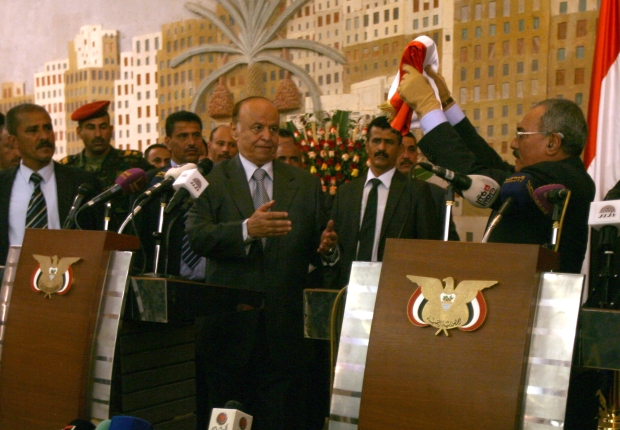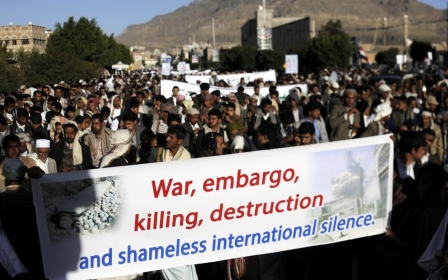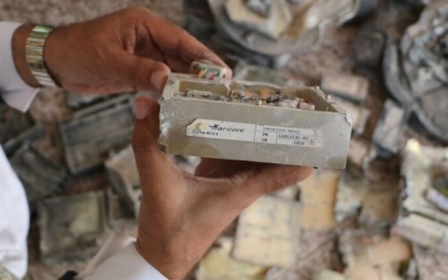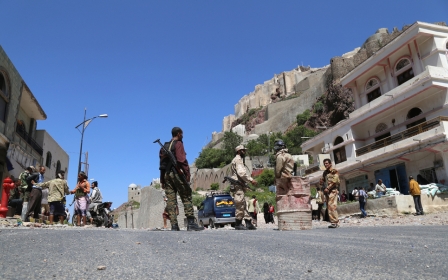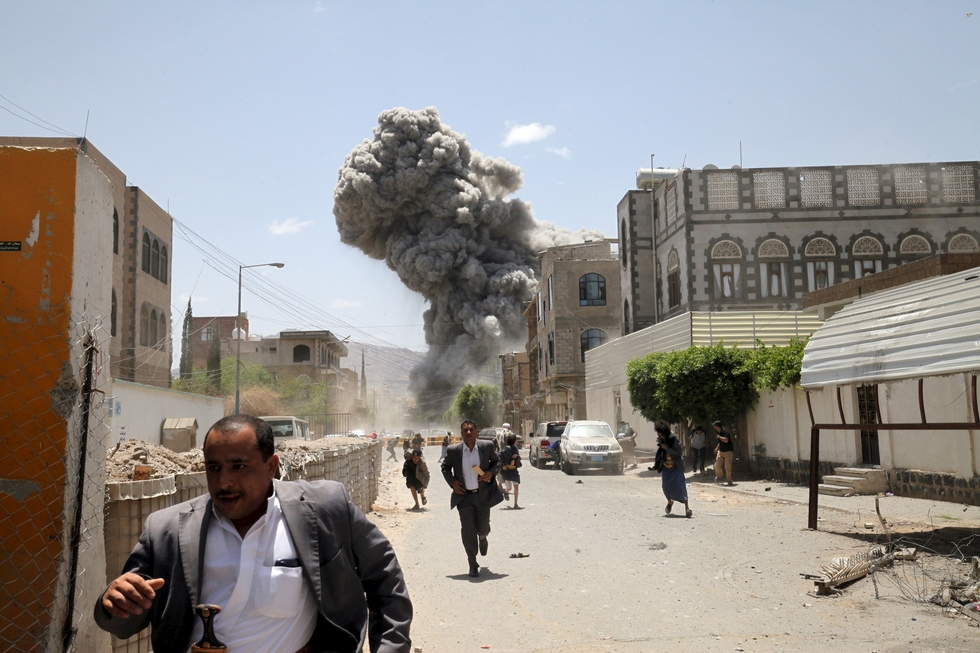
Yemen: Hopes for peace, fear of endless war
On my way to Sanaa airport in September, leaving Yemen after a reporting trip, I watched from my car window as one airstrike after another landed across the desolate landscape around me. Looking back, my heart ached for the family I was leaving behind, for the starving children I had met on Sanaa’s streets, for Khadija Al-Bayna, in Hajjah, who had lost her teenage sons and breadwinners when a strike hit the water-bottling plant where they worked, for Fareed Shawky who pleaded: “Don’t bury me, Don’t bury me” as he was being treated for injuries sustained after Houthi shelling…
Today, as the end of the year is fast approaching, the Geneva talks we have been eagerly awaiting have yet to begin. So far, 5,604 Yemenis have been killed – 2,577 of them civilians. An estimated 60 percent of the civilians killed in the first seven months of the fighting died as a result of a campaign of air strikes by a Saudi-led coalition, according to a joint report by the United Nations’ Office for the Coordination of Humanitarian Affairs and the UK-based charity Action on Armed Violence, published in October.
Nine months into this war, Yemenis are hopeful that the Geneva talks may lead to a solution. However, is this achievable? For weeks now, a battle has been raging in Taiz, where the UN has accused Houthi fighters and their allies of blocking desperately needed humanitarian supplies to the town of 200,000, which has been under a “virtual siege” for weeks. Meanwhile, Aden, the only area coalition forces have so far managed to “liberate” (in July of this year), is beset by lawlessness. Al-Qaeda in the Arabian Peninsula (AQAP) fighters are now visibly present in several parts of the city. On 6 October, suicide bombings claimed by the Islamic State struck a coalition military base as well as a hotel housing Yemeni government officials, killing 15 people.
The Houthis and their allies, on the one hand, and the Saudi-led coalition, on the other, are both desperately trying to gain ground and consolidate their positions ahead of the Geneva talks. These are all clear elements of an intensifying tug-of-war between the two sides, presumably to strengthen their leverage during negotiations. On 7 November, the Yemeni Vice President, Khaled Bahah, explicitly confirmed that pro-government forces intend to “liberate” Taiz before any peace talks get under way.
Geneva talks
In this context, I cannot help but wonder how fruitful the Geneva talks - if they do take place at all - will prove to be. The first round, held in June 2015, ended in miserable failure. As a journalist covering the proceedings, I quickly realised these were not typical peace talks: we spent our time shuttling between two hotels, with not much “talking” to report on as both parties failed to find a way of being in the same room.
For me, this was deeply frustrating: My family back home was bearing the brunt of this war, and I was incredulous and livid at how relaxed the negotiators on both sides were. It infuriated me to hear them telling me that “Yemenis are resilient” and would survive the current upheavals until victory prevails. Yes, Yemenis are resilient, but as I’ve witnessed time and again, they are also desperate and tired.
Most are now sick and tired of the political games being played with their fates and at their expense in far-away hotel lobbies. With air strikes rain on them daily, Houthi shelling, suicide bombings and a brutal economic blockade that has left over 80 percent of Yemenis in dire need of humanitarian aid, their resilience is running thin.
When the announcement was made that the talks had concluded without an outcome, I remember walking to my hotel room, utterly drained and dejected, thinking about how I could convey the news to my loved ones back home, who had been expecting so much from these talks, to tell them that, once again, they had been let down.
Leading up to Geneva 2, people are debating who bears most responsibility for the delays. Sources close to the talks in Oman have told me that the Houthis are insisting on a ceasefire prior to the initiation of any peace talks, a request the Saudis have firmly rejected.
Rumours are also circulating that President Hadi has been engineering obstacles to prevent the talks from going ahead. Indeed, on the 1 December Reuters reported that diplomats following the peace process say he is increasingly an obstacle. This has intensified pressure on his Saudi sponsors to withdraw their support or help shunt him aside. "Hadi has been trying to block any kind of talks because he knows that any settlement will be the end of this political career," said one diplomat who follows Yemeni politics, speaking on a condition of anonymity to Reuters, before adding: "Hadi has never been popular and it’s not in his interest that the war stop before complete victory. Diplomats know that Hadi is not a serious candidate, and a settlement means he’s out."
Listening to these remarks, I remembered the day Hadi was sworn into power. I was sitting in the press box and could feel the sense of relief spreading across the room at the thought that a dictator of 33 years - President Ali Abdullah Saleh - had finally been ousted. Today, it is abundantly clear that Hadi, like his predecessor, is determined to cling onto power.
For their part, both the Saudi-led coalition and its ally, Hadi's government, have accused the Houthi-Saleh alliance of showing little commitment themselves to implementing UN Security Council Resolution 2216, which calls for the Houthis to withdraw completely from key cities, surrender their heavy weaponry and allow Hadi’s government to return to Sanaa.
However, many are questioning how relevant UNSCR 2216 can be now in an utterly transformed political landscape. One sticking point is the fact the resolution only calls for the Houthi militias to be disarmed even though a host of new actors have emerged on the ground since the resolution was formulated.
Adam Baron, of the European Council on Foreign Relations (EFCR), told me that “any potential peace deal really would need to incorporate the actual powers on the ground to have any hope of being effective.”
While Saudi Arabia and the Houthis are the main protagonists in this conflict, several secondary players have joined the fray on both sides. Most notably, Iranian influence has been very evident - leading to invocations of ‘proxy war’ - though its actual nature, scale and motivations have been far less so. What is undeniable, however, is that Houthi forces could not have reached Sanaa, let alone retained their hold on power in the months since, without their key alliance with Yemen's ousted president, Ali Abdullah Saleh.
Another issue is that Resolution 2216 has been viewed not as a process to be implemented via negotiations but as a precondition to negotiations themselves. In recent months, the US and its allies have repeatedly insisted that this be changed, a position now accepted by the Yemeni government. It has now decided to enter the talks, despite the absence of an agreement on a timeframe, having previously insisted that 2216 be implemented as a precondition of negotiations.
Meanwhile, an especially worrying trend has been a deepening perception - particularly in Saudi Arabia and the Gulf states – of the conflict in Yemen through the lens of Saudi-Iranian confrontation, where Houthis are seen as representing an Iranian threat - a perception that is increasingly shaping the conflict dynamics inside of Yemen.
However, Baron says he tends to shy away from describing the conflict as a proxy war. “At the end of the day, this is a conflict that, on the ground, remains largely rooted in local issues.”
Through both their rhetoric and actions, the Houthis have arguably given their neighbours ample reasons for concern, including their highly symbolic decision to open direct flights to Tehran, as well as sending a high-level delegation to Iran to ask – unsuccessfully, as it turned out - for assistance with economic development.
Many are warning that fears over Iran’s growing influence risk becoming a self-fulfilling prophecy.
Despite its inability to provide military assistance to the Houthis - due largely to involvement in higher-stake regional showdowns in Syria and Iraq - Iran has nevertheless been successful in intimidating the Saudis.
A key player outside of the Saudi-Houthi dichotomy has been the Popular Resistance group, which played a major part in liberating Aden and is now active in Taiz. Amid a total collapse of state institutions and the absence of central government, the Popular Resistance has brought together a diverse array of political and social groups, securing generous financial and military support from the Saudi-led coalition.
Needless to say, the Popular Resistance is primarily an alliance of convenience that is unlikely to last the distance. Beyond a shared enemy - the Houthis - Resistance members harbour widely distinct motivations for joining the fight, as well as deep ideological differences. Everyone, though, seems to be agreed on one thing: securing Hadi’s return to the presidential palace is not a priority.
What next?
A few months ago, I was struck when asked, for the first time in my life, whether I was a Zaidi or a Sunni. For Yemenis to identify themselves by their place of worship or sectarian denomination, as is increasingly the case today, is a tragic new development and the direct product of a conflict that has ripped apart the country’s social fabric. This has not only reduced the chances of swift post-war reconciliation, but opened the doors for AQAP and IS, which thrive on poisonous sectarian rhetoric, to make Yemen a fertile ground for recruitment.
Efforts to provide official accountability in what has often been a brutal war that has taken a disproportionate toll on civilians have also stalled. In September a draft Dutch resolution that instructed the UN’s human rights chief to send experts to investigate war crimes committed by both sides in Yemen was blocked. In a farcical move, the UN has instead accepted an investigation due to be conducted by the Yemeni government, which is a party in the conflict alongside the Saudis.
In the absence of an independent UN effort, Human Rights Watch (HRW) in late November released its own investigation, featuring first-hand interviews with victims, witnesses, and medical staff. HRW’s investigators also visited sites that were hit by air strikes, including residential homes, urban markets, a factory, and a civilian prison. In all of these cases, HRW either found no evidence of a military target, or concluded that the attack failed to distinguish between civilian and military targets. The HRW report provides the names of 309 people – 199 men, 43 women, and 67 children – killed in the attacks, all believed to be civilians. Joe Stark, HRW’s Middle East director, commented that “the coalition’s unwillingness to conduct even a single investigation of numerous potentially unlawful airstrikes is appalling. While the coalition may have sophisticated weaponry and US support, its commitment to the laws of war is rudimentary at best.”
Despite this, US and UK support for the bombing campaign continues. Cole Bockenfield, the deputy director for policy in the Project on Middle East Democracy (POMED), told MEE: “While the US government has publicly called for all sides to halt fighting and seek a political solution, it is actively resupplying arms to one of those sides - the Saudi-led coalition - to continue fighting. The US has tried to maintain some position of distance from the conflict, but by providing intelligence and bombs used in the Saudi airstrikes, the Obama administration bears some of the blame for their misuse.”
On a visit to the UAE last week, US Secretary of State John Kerry declared his respect for the “significant progress” he says the UAE has achieved in Yemen. “We understand completely and support the reasons that Saudi Arabia and the UAE felt compelled to take acts of self-defence and to protect the security of this region.” For his part, UK Foreign Secretary Philip Hammond hinted in November that he could freeze arms sales to Saudi Arabia if it was shown that international law was being breached, but later failed to launch an investigation following a damning HRW report into an air strike, using a UK-made missile, that destroyed a civilian factory. Baron, of the EFCR, says Western military support for the war is unlikely to end before a political solution is found. “The US and UK would like to see this war end - but they'll continue to support the Saudi-led coalition until some political resolution is reached.”
What would a political solution look like?
With support from backers on both sides looking unlikely to waver anytime soon, and towns changing hands every week, all parties in the conflict must realise that definitive military victory is implausible. While the Houthis have been ousted from Aden, and their control over Taiz is looking increasingly shaky, the Saudis seem to have no clear plan for the future either. Even if they successfully manage to disarm the Houthis and push them back to their stronghold in Saada, the question of who would fill the resulting power vacuum remains unanswered.
And yet, I continue to pray hard that I will soon be able to return to the Yemen I know and love; the Yemen where I drank tea in ‘Qubat Al-Mahdi, on a balcony overlooking the breath-taking vistas of the old city, parts of which have been obliterated by air strikes; the Yemen where children play freely on the streets without having to duck under the sounds of fighter jets overhead. While I don’t know whether we can survive this for much longer, the prospects of peace, nine months into this war, seem very dim.
One thing seems certain. After all the bloodshed the country has witnessed these past few months, a return to power for President Hadi seems unthinkable. As such, with sectarian rhetoric bubbling on the surface, and groups such as AQAP and IS taking full advantage of the chaos and mistrust, the realisation that Sanaa is likely to find itself soon without a functioning government or army of any sort is a terrifying prospect.
- Nawal Al-Maghafi is a Yemeni/ British journalist and filmmaker. She has had her work featured at Channel 4, BBC Newsnight, BBC World and BBC Arabic, amongst others.
Image: The views expressed in this article belong to the author and do not necessarily reflect the editorial policy of Middle East Eye.
Photo credit: Yemeni residents flee during an airstrike in Sanaa. (AFP)
New MEE newsletter: Jerusalem Dispatch
Sign up to get the latest insights and analysis on Israel-Palestine, alongside Turkey Unpacked and other MEE newsletters
Middle East Eye delivers independent and unrivalled coverage and analysis of the Middle East, North Africa and beyond. To learn more about republishing this content and the associated fees, please fill out this form. More about MEE can be found here.


